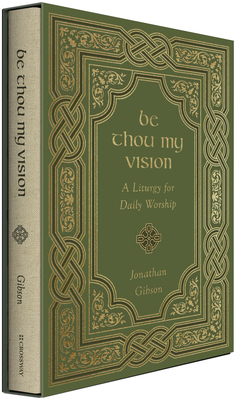Be Thou My Vision: A Liturgy for Daily Worship. Jonathan Gibson. 2021. [November/December] 352 pages. [Source: Review copy]
First sentence: It may come as a surprise, but there is no explicit command in Scripture to have a time of worship each day, either as an individual or as a family. And yet it is a habit that every Christian believer or Christian family is encouraged to practice. The name of the habit may vary depending on one's Christian tradition or background--"devotion," "quiet time," or "personal or family worship"--but the basic elements of Bible reading and prayer are usually present.
ETA: I first read this one in 2021. I liked--really liked quite a few things about it. I mentioned at the time that I wanted to give it a 'proper' go. To use it for a month--or two, or three--to see how well I liked it--or not.
I started using the Be Thou My Vision devotional in December 2022. I also continued using it in January 2023. Now that I've read through it three times, I can now say that I definitely enjoy it. I do think it is solid and steady.
Original review:
What you see is what you get. This is a LITURGY for DAILY WORSHIP. Thirty-one days of liturgical worship that can be repeated to infinity (and beyond).
The structure of the liturgy for daily worship is:
CALL TO WORSHIP (thirty-one Scripture readings, these are taken from both Old and New Testaments)
ADORATION (thirty-one prayers--all focused on praise and adoration--taken from church history; I believe the doxology is included under this heading as well)
READING OF THE LAW (seven readings taken from Scripture--from both Old and New Testaments--regarding the law)
CONFESSION OF SIN (thirty-one prayers--all focused on confessing sin--taken from church history)
ASSURANCE OF PARDON (thirty-one Scripture readings--focusing on assurance of forgiveness of sins--taken from both the Old and New Testaments)
CREED (alternates three creeds, but one of the three creeds is divided into three; Apostles' Creed, Nicene Creed, Athanasian Creed)
PRAISE (Gloria Patri, two versions alternating weekly)
CATECHISM (refers you to an appendix where you'll read from the Heidelberg Catechism or the Westminster Shorter Catechism. These are undated; you are encouraged to read one question a day.)
PRAYER FOR ILLUMINATION (seven prayers from church history, repeated weekly)
SCRIPTURE READING (refers you to an appendix where they share the M'Cheyne reading plan. Here's where it gets confusing, the plan clearly has you reading FOUR chapters a day, but the book has you just reading one chapter a day????)
PRAYER OF INTERCESSION (thirty-one prayers from church history; you are also encouraged to pray on your own for personal, church, world needs)
LORD'S PRAYER (daily)
The book has five appendices: musical tunes for the Doxology and Gloria Patri, the two catechisms, the M'Cheyne reading plan, and the collects from the Book of Common Prayer, and author index.
The book pulls in sources from all over--including the Book of Common Prayer. The structure is different from that of the Book of Common Prayer, and yet there are similarities to a certain degree. It does offer more variety in some ways.
I think you could definitely improvise with this as well. You wouldn't have to read just one chapter from a daily reading plan that clearly and obviously has four readings. You wouldn't have to follow this reading plan at all.
I do wish that one of the sections was focused on the PSALMS and taking you through the Psalms each month. That's one of my favorite, favorite, favorite things about doing the Daily Offices from the Book of Common Prayer.


No comments:
Post a Comment